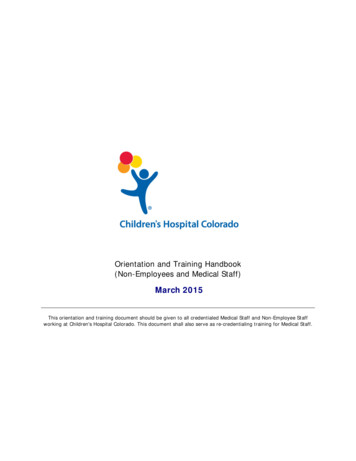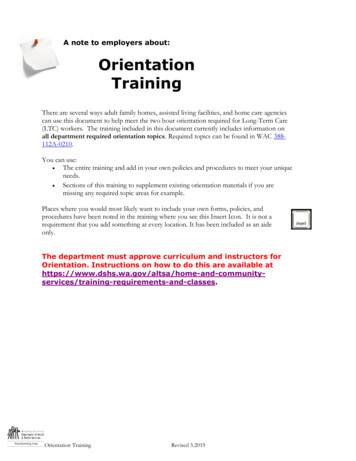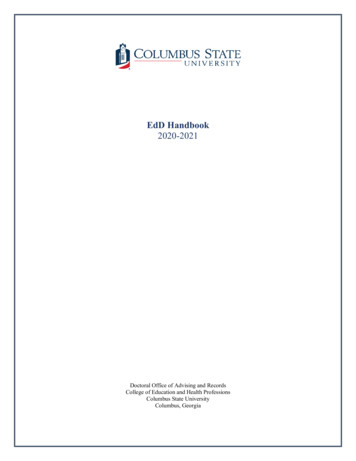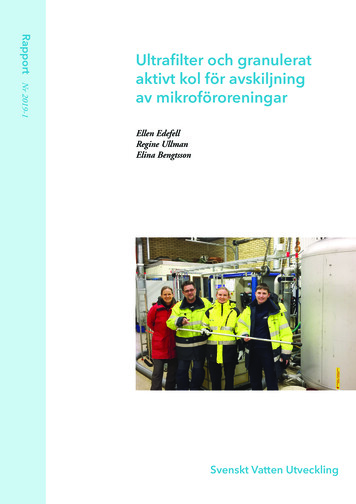
Transcription
Orientation and Training Handbook(Non-Employees and Medical Staff)March 2015This orientation and training document should be given to all credentialed Medical Staff and Non-Employee Staffworking at Children's Hospital Colorado. This document shall also serve as re-credentialing training for Medical Staff.
2015 Children’s Hospital Colorado Orientation and Training HandbookCONTENTSWELCOME TO CHILDREN'S HOSPITAL COLORADO STANDARDS OF BEHAVIOR .CORPORATE COMPLIANCE PROGRAM RESEARCH COMPLIANCE .INFORMATION SECURITY/PRIVACY AND CONFIDENTIALITY .HEALTH INFORMATION MANAGEMENT (HIM) .ADVANCE DIRECTIVES PHYSICAL SECURITY SERVICES FACILITIES OPERATIONS .INFECTION CONTROL .OCCUPATIONAL HEALTH/OSHA ACKNOWLEDGEMENT CARD 3512222425262728333640Page 2 of 40
2015 Children’s Hospital Colorado Orientation and Training HandbookWELCOME TO CHILDREN'S HOSPITAL COLORADOAs a Credentialed Medical Provider or Non-Employee staff member, you are responsible for: Reading this material and Sending the signed/dated Acknowledgement Card to your appropriate contact/responsible party (listed atthe bottom of the Acknowledgment Card).MissionTo improve the health of children through the provision of high-quality coordinated programs of patient care,education, research, and advocacy.VisionChildren’s Hospital Colorado will be the leader in providing the best healthcare outcomes for children. We will be thedriving force, in partnership with others, in providing children and their families with an integrated pediatrichealthcare delivery system. We will be a national leader in pediatric research and education.Values StatementFor a child’s sake, we are a caring community called to honor the sacred trust of our patients, families and eachother through humble expertise, generous service and boundless creativity. This is the moment.Children's Hospital Colorado (CHCO) is committed to providing staff who are appropriately trained to work at apediatric facility. This booklet is for any non-employee staff for orientation and training purposes. We define staff tobe:CATEGORYAffiliatesBoard of CRIPTIONStaff from Affiliated organizations working at CHCO, such as: University Physicians, Inc. The University of Colorado School of Medicine University of Colorado Hospital Staff (MedStaff and Nursing must be credentialed) University of Colorado Health System Kempe Center Denver Health National Jewish Health Centura Home Health CHCO Board of Directors members CHCO Foundation Board of Directors membersAny contractor providing business services that is not part of an affiliated group, such as: Kelly Services Kempe Foundation Agency Medical Interpreters Facilities Operations, e.g., Construction Contractors Consultants Environmental Serviceso Crothallo Securityo HSS Bio-Med Courierso Laundry Hospital Coop Valet/Concierge Copy Center & shredding, e.g., Bayaud Non-employees who aren’t elsewhere defined, who participate in research, whether or not they arereceiving funding from the research study.Any contractor providing care to patients or interacting with patients (not medical staff orallied staff with privileges), such as: Travelers, Therapists (Occupational, Physical, Respiratory, Audiology. Speech and Learning) Advance Practice Nurses Surgical Techs Perfusionists Emergency Medical Technicians Kaiser Nursing Staff Aurora Public School Teachers Peri-operative surgical vendorsPage 3 of 40
2015 Children’s Hospital Colorado Orientation and Training HandbookCATEGORYEmployeesMedical Staff andPrivileged AlliedHealthRemote UsersVolunteersDESCRIPTIONStaff Paid by CHCO Children's Hospital Colorado Children's Hospital Colorado FoundationMedical Staff or Privileged Allied Health professionals providing direct patient care Medical Staff: Medical Doctors (MDs), Doctors of Osteopathy (DOs), Doctors of Dental Surgery(DDSs), Doctors of Psychology (PsyDs), Psychologists, Doctors of Philosophy (PhDs) Privileged Allied Health: Physician Assistants, Child Health Associates, Licensed Clinical SocialWorkers, Dental Assistants, Surgical Assistants, Intraoperative Monitors, others.Nurse Credential Review Board (NCRB) Registered Nurses (RNs),Advance Practice Nurses ( APNs), Pediatric Nurse Practitioners (PNPs)Users who are never onsite at CHCO but have access to its systems, such as: Referring Providers and their Office Staff IT Support Vendors Organizations using EPIC application services, such as PedsConnect Practices Revenue Cycle Vendors and Consultants Researchers off site UPI Remote Support OthersVolunteer staff for CHCO, such as Junior Volunteers, off-campus Volunteer Chapters andprograms.STUDENTS/INTERNSInterns: paidEmployed Student (or non-student) Intern (Paid temporary employees with posted positions)Interns: unpaidStudent Intern sponsored by an accredited school program when the intern is gaining creditand has to perform certain duties/pre-requisites to meet the education program requirementsin the job/field of study.Trainees/Students completing training at CHCO through contracted, formalized medical educationStudents - Clinicalprograms and who will be interacting with patients, such as: Residents, Fellows (including visiting) Medical students Dental students CHA/PA Students International Trainees Post Graduate (non-physician) Nursing Students Non-medical post grad interns (ASL, PT, OT, RT, Psych, Pharmacy, etc.) Denver Health Emergency Medical Technicians“Staff” does not include visitors to CHCO (e.g., friends and family of patients; people attending conferences oreducational sessions offered to the community and the healthcare/business community in general; the media,vendors and sales representatives; external reviewers and observers here to look at some aspect of CHCOoperations).As a CHCO staff member, you are held to the Standards of Behavior Promise and are expected to demonstrateprofessionalism in your actions including how you treat others. Please see our guidance below regarding respectingand establishing professional boundaries and our “Promise” on the next page.Professional BoundariesProfessional behavior includes creating boundaries in your relationships with patients and families.Examples of these boundaries include: Not sharing information about one patient or family with another patient or family or with anyone else whodoes not have a business need to know the information; Avoiding interactions with patients or families on social media/networking internet sites; Limiting interventions with a patient to those that are within the scope of your profession; Providing care only within the approved scheduled work hours; and Demonstrating appropriate and professional behavior when encountering family members of currentpatients in a setting outside of the healthcare site.Any questions or concerns that surface regarding the appropriateness of relationships with patients and familiesshould be addressed with: A direct supervisor; Another supervisor within the chain of command; A Human Resources representative; or Corporate Compliance.Page 4 of 40
2015 Children’s Hospital Colorado Orientation and Training HandbookSTANDARDS OF BEHAVIORPage 5 of 40
2015 Children’s Hospital Colorado Orientation and Training HandbookGENERAL ORIENTATION Working at CHCOTrainingPoliciesQuality and Organizational EthicsVisitorsWORKING AT CHCOAuthorization Process for WorkingOur non-employee staff is made up of people doing many different tasks and working for many different employers.Because of that, we want to make sure that our staff has been given the proper review or authorization beforebeginning work. This includes background checks, health screening, licensure/certification, insurance/liability,whether or not you’ll need computer access, providing necessary training and general orientation to our facility.Health Screening ProceduresYou are to refrain from coming to the hospital or other CHCO care locations if you have any symptoms suggestingyou might have a contagious health concern. All non-employees must have a health screening form filled out bytheir physician and submitted to their Children’s Hospital Colorado contact prior to starting at CHCO. OccupationalHealth Services (OHS) cannot provide health screening services for you.You must be aware of how to report injuries and who to report to at your employer for injuries that occur at CHCO.Only CHCO-paid employees and CHCO Foundation members are covered under CHCO workers’ compensationpolicies.Reporting for WorkAll staff should meet with their CHCO Responsible Party prior to the start of their assignment so that paperwork andorientation materials can be completed.Management of Human ResourcesAs a non-employee staff member, you may have a job description or a contractual agreement that identifies therequirements for your position and describes the essential functions of the position. Your CHCO Responsible Partywill oversee your work.If you provide direct patient care, you are expected to demonstrate population-specific competencies and knowledgeof abuse and neglect recognition. Your CHCO Responsible Party will provide you with additional information aboutpopulation-specific competencies as they apply to your position. You will be evaluated during and/or at the end ofyour assignment.Identification BadgesAll individuals working at CHCO must wear an identification badge while on assignment at any CHCO location.Parking/Access Control Services will issue your identification badge on your first day. When your assignment ends,you must return your ID badge to the Responsible Party who was overseeing your work or to Parking/Access ControlServices directly. Badges should be worn above the waist with a breakaway lanyard/clip.ParkingFor CHCO staff, parking by permit is required to use hospital parking lots. Bicycle parking racks are located outsidein various locations on the campus. Parking permits are available from the Parking/Access Control office. Forspecific information, contact Parking/Access Control at 720.777.9775 or visit the Access Control webpage on MyChildren’s Colorado. Parking and Access Control hours of operation are Monday - Friday 7:00a to 4:00p. Specialparking arrangements for physical impairment are also handled by Parking/Access Control Services.TRAININGAnnual TrainingAs a non-employee, it is your responsibility to become adequately trained for working on CHCO premises. Each yearstaff who have worked, or are planning to work, at CHCO for more than 30 days are required to take the "AnnualTraining" which is posted on the CHEX system. The Annual Training addresses the following topics: CorporateCompliance, Environment of Care, Infection Control, Occupational Health/OSHA, and Quality/Patient Safety.Additional topics or modules may be required from year to year. Your CHCO Responsible Party will assist you withthis training. If you have questions, please contact Human Resources.Page 6 of 40
2015 Children’s Hospital Colorado Orientation and Training HandbookPOLICIESCHCO Policies, Procedures, and GuidelinesIt is the responsibility of all staff who work at CHCO, regardless of their employment status, to familiarize themselveswith and follow all CHCO Policies, Procedures, and Guidelines pertinent to their job function. Go to My Children’sColorado and click on “Policies and Procedures.” Ask your CHCO Responsible Party to orient you to policiesapplicable to your function.Dress Code PolicyDress code guidelines are intended to assist staff members in meeting CHCO standards. Guidelines follow businesscasual dress, with the primary focus on clean, neat, and professional appearance. Departments may establishadditional dress code standards and procedures based on specific needs. Please review the following:Clothing Clothing must be clean, unwrinkled, stain-free, properly fitting, and in good repair. Clothing must have a modest neckline. Skirt and dress length must be at or below the knee. Denim skirts and dresses (knee length) may be worn; overall appearance must be professional. Tailored capri pants (calf length) may be worn. Scrubs may be required in designated/sterile areas. If required, CHCO furnished, freshly laundered scrubsmust be put on upon arrival at work and may not be worn to/from CHCO. Uniforms may be required in designated areas. Uniforms must be maintained in good condition, clean, andworn as recommended by department manager. Lab coats and ties must be laundered regularly.If clothing becomes contaminated with blood or other infectious material, remove clothing, place in a blue plasticlinen bag, change into scrubs and take contaminated clothing to Materials Management. (See IC-001-A BloodbornePathogen Exposure Control Plan).CHCO and related/affiliated organizations’ logo clothing, in good repair, may be worn with department managerapproval.Inappropriate/not permitted: Tight, sheer or provocative clothing Visible undergarments Clothing displaying bare midriffs or torsos Spandex tops, tube tops, halter tops and tank tops Tops or dresses with spaghetti straps Athletic attire; sweatsuits; hooded sweatshirts (hoodies) unless approved by department manager Denim pants of any color, unless manager determines attire is appropriate for assignment/business needs Cargo pants, unless manager determines attire is appropriate for assignment/business needs Spandex pants, shorts, capris - length above mid-calf Hats, unless associated with a departmental uniform or worn for health/religious reasons Clothing bearing commercial advertising or a political, controversial, inflammatory, or provocative messageShoes Shoes must be clean and in good repair with a height and style supporting safety and infection control inthe work environment Thong style shoes/flip flops/beach sandals are prohibited throughout CHCO facilitiesFor the Patient Care Team: Open-toed shoes may not be worn Shoes with fully enclosed heels or secured with a heel strap are preferred, for safety reasonsHair Hair must be clean and well groomedHair color or style may not be extremeMoustaches and beards must be groomed and cleanFacial hair may not interfere with the use of personal protective equipmentStaff members must maintain a clean body that is free from odorsFragrances are discouraged due to the potential negative effect on patients and staff with sensitivitiesPage 7 of 40
2015 Children’s Hospital Colorado Orientation and Training HandbookNails(Please see Infection Control – Artificial Nails page 33)Jewelry and Body Art Jewelry and other accessories, if worn, must be professional and appropriate for safety in patient care areas Ear piercings, including studded earrings, small hoops, and gauged earrings less than ¼ inch in diametermay be worn A small stud on the side of the nose may be worn Every effort must be made to cover visible tattoosInappropriate/not permitted: Pins, buttons, jewelry, emblems, or insignia bearing a political, controversial, inflammatory, or provocativemessage Jewelry adorning body piercings, other than ears and nose (as described above). Tongue jewelry is notpermitted.Non-Smoking PolicyCHCO is a tobacco and smoke-free work environment. Go to the MyChildrens Resources Smoke-free Campuswebsite if you would like more information or assistance in quitting.QUALITY AND ORGANIZATIONAL ETHICSImproving Organizational PerformanceAll CHCO quality performance initiatives have gone through organization-wide planning and prioritization, and havebeen approved by the Executive Team and the Board of Directors.Accreditation by The Joint CommissionCHCO is accredited by The Joint Commission. Staff may email a complaint directly to The Joint Commission at thefollowing address (complaint@jointcommission.org) or call 1.800.994.6610. CHCO has a policy on non-retaliationthat would apply to anyone reporting to The Joint Commission as well as internal reporting of concerns. See NonRetaliation in Reporting Misconduct or Variances on My Children’s Colorado.Patients’ Rights Informed Consent Patients’/Parents’ Rights & Responsibilities Patient/Family Education Grievance Mechanism for Patients / Families / Legally Authorized Representatives Language and Cultural Services at CHCO Patient Safety Assessment for Domestic ViolenceInformed ConsentRequires that the patient, and when appropriate, the legally authorized representative, is given a clear, conciseexplanation of the patient’s condition and any proposed treatment or procedures, the potential benefit and drawbackof the proposed treatment or procedure, problems related to recuperation, and the likelihood of success.Information is also provided regarding any significant alternative treatment or procedure.The Patients’/Parents’ Rights & ResponsibilitiesBrochures and posters inform patients/legally authorized representatives that they may contact the PatientRepresentative within CHCO and provide the phone number and address of the Colorado Department of Public Healthand Environment (CDPHE). Brochures are available for patients and families and posters providing the sameinformation contained in this brochure are hanging throughout the facility. Extra copies of the brochure (in bothEnglish and Spanish) can be obtained from the Volunteers and Family Services Department or on My Children’sColorado.Patient/Family EducationLearning needs, the readiness of patients and families to learn, as well as education provided, should be documentedthrough progress notes and flow sheets and on the nurses’ Discharge/Transfer Summary Form (all disciplines areencouraged to document on this form as needed). CHCO addresses the academic needs of patients through theComprehensive Medical Inpatient School Program.Page 8 of 40
2015 Children’s Hospital Colorado Orientation and Training HandbookCHCO provides and documents interactive patient education through return demonstration/understanding. There areprinted resources that have been developed and are utilized for patients as well (e.g., In Care of Kids Handouts onCVC Care).CHCO supports the education of the patient and family through: availability of printed educational materials from the Family Health Library and the Intranet;, patient/family education focused task forces and committees; MD Consult and Nurse Consult on line; and approved educational videos, presentations, and teachings.Patient/family education is provided collaboratively among various disciplines. The individual disciplines communicatewith each other regarding patient education needs and provide services as needed.Grievance Mechanism for Patients/Legally Authorized RepresentativesCHCO has a defined process for responding to patient/parent/legally authorized representative complaints andgrievances as delegated to the Patient Relations Department by the Board of Directors of Children's Hospital Coloradoto ensure that, regardless of the type of concern, there will be a prompt and fair resolution.Complaints are: Issues that are brought to the attention of the Patient Representative without prior attempts at resolutionwith the involved staff/department. Issues that can be addressed immediately by the staff present. Issues pertaining to fees/bills that are not reflective of perceived poor care or service.Grievances are: Issues that Issues that Issues thatdischarge. Issues thatcannot be resolved by the Patient Representative after referral to the involved staff/department.need the attention of staff other than those initially present.are brought to the attention of the hospital by the patient/legally authorized representative postare communicated in writing (web, email, written letters).CHCO encourages patients and families to speak out and present grievances without fear of retribution.Contact information for the CDPHE: Colorado Department of Public Health and Environment (303.692.2000, 4300Cherry Creek Drive South, Denver, Colorado, 80246-1530)Language and Cultural Services at CHCOWe recognize the importance of providing care to patients and families in the language they can understand. Wesupport the effective delivery of care through the use of trained medical interpreters. Patients and their familymembers/friends or untrained personnel should not be used as interpreters. For any questions or comments pleasecontact the Medical Interpreters Department at 720.777.9800.How do I identify my patient’s or family member’s language needs If you are unable to identify your patient’s or family member’s preferred written and spoken language byasking them directly, utilize the Interpreter Services Language Identification Card.A Laminated Interpreter Services Language Identification Card must be readily available at all times at allcheck in stations/desks or at any location in which a patient/family member may come to for assistance.This is a regulatory requirement.Non-laminated copies of the card should be available at these locations for the patient/family to carry withthem if they choose to do so throughout their visit to CHCO. Staff should circle the language of choice sopatients and families can carry the non-laminated copy with them allowing other staff to readily identify theneed.Once the preferred spoken and written language has been identified, the staff member needs to access aninterpreter via the Medical Interpreter Department or the telephone service language line.Patient care is not to be delayed while waiting for an in-person interpreter. The telephone service languageline or video relay interpretation services must be utilized until an in person interpreter arrives if applicableor available.Document the preferred spoken and written language in the patient’s chart.Page 9 of 40
2015 Children’s Hospital Colorado Orientation and Training Handbook For additional or replacement language identification material, contact the Medical Interpreter Departmentat 720-777-9800.Addressing linguistic needs is required: Office For Civil Rightso Title VI of the Civil Rights Act of 1964 states: "No person in the United States shall, on ground of race,color, or national origin, be excluded from participating in, be denied the benefits of, or be subject todiscrimination under any program or activity receiving Federal assistance."National Standards on Culturally and Linguistically Appropriate Services (CLAS)Americans with Disabilities Act (ADA)The Joint Commission (JC)o Identifying and addressing patient communication needso Collecting race and ethnicity datao Collecting language datao Providing language serviceso Addressing the qualifications for language interpretersDepartment of Health and Human Services (DHHS) (4 CFR §46.116 and 117)Food and Drug Administration (FDA) regulations (21CFR50.25 and 50.27) require the informed consentinformation to be presented in a language understandable to the research subject.Qualified Bilingual Staff ProgramThe Qualified Bilingual Staff (QBS) Program was established to provide another language resource for patients andfamilies. It designates Spanish speaking staff as "competent" to provide a service in Spanish or serve as a MedicalInterpreter within their specialty or department. For more information, contact the Medical Interpreter Office at720.777.9800.Sign LanguageCHCO provides sign language interpretation either by an in-person Registry of Interpreters for the Deaf (RID)certified interpreter or by video remote interpretation (VRI) services for patients and parents/legally authorizedrepresentatives who are deaf or hard of hearing.Telephonic interpretation through Cyracom24 hour telephone language services can be accessed from any analog phone or digital phone by dialing 1-800-4813293. You may use the Cyracom phones in the rooms or from any PCD (a CHCO portable communication device).You will need a department pin number. Residents and medical students, please check with your GME office. Otherpersonnel please check with your Department Manager.How to Access an Interpreter All CHCO Locations (except CHCO Memorial)oThe Medical Interpreters Department phone number is X79800 or call the House Supervisor afterhours for assistance.oFor 24 hour telephone language services, please use a blue phone, speed dial on Cisco phones whereapplicable, dial 1-800-481-3293 from any phone or X61111 from any PCD (Cyracom account number:501016867, your pin number- please contact the Medical Interpreter Department if you need a newpin).CHCO Memorial LocationsoThe Medical Interpreters Department number is X52690 for all language services/needs.Patient Safety Assessment for Domestic ViolenceDomestic violence is a healthcare issue for many families and can be especially harmful to children who arevulnerable. It's estimated that 3-4 million women are battered in this country each year (www.Safehorizons.org).When the parent of a child is being abused, the child in the home is also at greater risk for abuse than those childrengrowing up in nonviolent homes. In homes where there is domestic violence, studies estimate the number of childrenat risk for exposure to family violence to be between 3.3 million and 10 million (Domestic Resource Center,www.dvrc-or.org). Staff in clinical areas are taught about screening for domestic violence.Page 10 of 40
2015 Children’s Hospital Colorado Orientation and Training HandbookVISITORSVendorsIn 2010, our Vendor Program was implemented. As a reminder, all vendors and sales representatives coming intoCHCO must have an appointment with the department they are visiting and be registered with the vendormanagement system.Please review the policies and ensure you are familiar with the information: Vendor Policy and the Business Ethics:Gifts Policy and Interactions with VendorsDo: Make sure the vendor representative is registered and signed into the vendor management systemcomputer when they visit CHCO;Ensure the representative has an appointment;Make sure the vendor is wearing a temporary vendor badge produced by the vendor management system(check the date on the badge!);Use the Value Analysis Team (VAT) and ePro process for purchasing new products.If you have vendors or sales representatives in your area who are not checking in properly, please remind them thatthey must be registered with the vendor management system. If you need assistance with getting a vendor tocomply, please contact Materials Management or Corporate Compliance.Upon arriving at Network of Care (NOC) sites, business visitors, including vendors, must register/check-in with theFront Desk staff.Don’t: Don’t accept gifts from vendor representatives including: Pens, notepads, mugs, bags, etc. Sporting event or concert tickets Meals Gift cards and food (gift baskets, cakes, etc.)Don't allow vendors: On the nursing units, in other patient treatment rooms, or labs without staff escort. In any storerooms.Don’t accept and distribute samples Exceptions are approved by Materials Management (example: formula provided by nutrition services).Don't accept speaking relationships and contracts without having them reviewed and approved.Per the Guidelines for Visitors Who Conduct Business at Children's Hospital Colorado handout, vendors are notallowed to provide food or gift baskets for CHCO staff. If a vendor does provide food or a gift basket, it must betaken to the Volunteer office to be donated to patients and families.CHCO aligns with Healthcare Industry standards for policies and guidelines surrounding vendor interactions. Pleasesee the PhRMA Code on Interactions with Healthcare Professionals and AdvaMed Code of Ethics for moreinformation.Bringing Your Child to Work to Perform Work for CHCOPlease note that it is imperative CHCO staff members remember they cannot bring their children in to do work forCHCO without having them go through the proper onboarding process (e.g., Junior Volunteer program for volunteerwork; HR for all other student or temporary/intern or project work staff). This includes doing work on research andgetting paid through research grants.If you have questions, please contact Corporate Compliance at 720.777.2566.Page 11 of 40
2015 Children’s Hospital Colorado Orientation and Training HandbookCORPORATE COMPLIANCE PROGRAMMarch 2015To All Staff at Children’s Hospital Colorado:CHCO has always been committed to honesty and integrity, whether it’s with our patients and families, employees,healthcare providers, third-party payers, regulatory agencies, vendors, or the community. This commitment is thefoundation upon which our values and our organizational culture are built. This Code of Conduct is intended to helpguide those of us who work at Children's Hospital Colorado.Compliance is about appropriate business conduct and ethical behavior. We must hold ourselves to the higheststandards of character and integrity. All of us should be aware of the emphasis being given to compliance with alllaws and understand our responsibilities.The success of our Corporate Compliance Program requires the support and commitment of each of us, so that wecan continue to fulfill our mission to children and their families.Sincerely,Kevin ReidyChairman, Board of DirectorsJena HausmannPresident and Chief Operating OfficerInterim CEOCODE OF CONDUCTIn recent years, corporate compliance has become an important topic in healthcare organizations. Detecting andpunishing violations of federal, state, and local laws and regulations by healthcare providers is now a priority forfederal and state enforcement agencies. Violations in these areas put hospitals at risk for cri
Orientation and Training Handbook (Non-Employees and Medical Staff) March 2015. This orientation and training document should be given to all credentialed Medical Staff and N on-Employee Staff working at Children's Hospital Colorado. This document shall also serve as recredentialing training for Medical Staff.










